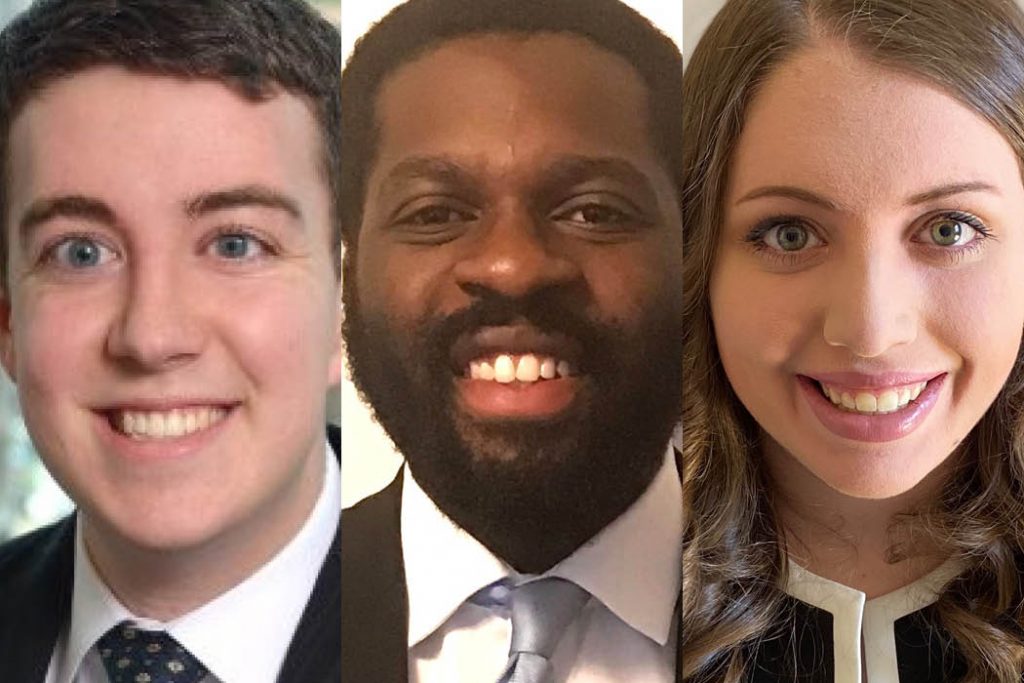On August 27, the US Court of Appeals for the Ninth Circuit granted the appeal for Kenia Martinez-Mejia, a Salvadoran woman fleeing domestic and gang violence whom the Boston College Law Ninth Circuit Appellate Program (NCAP) was representing. Ezra Dunkle-Polier ’20, Kevin Collins ’20, and Mary Lorenzo ’20 (above) briefed and presented oral argument to a three-judge panel in April arguing on behalf of their client.
Martinez-Mejia is from El Salvador and was physically and sexually abused by her father for more than 20 years. He tried to control every aspect of her life, from how she dressed and where she worked to whom she was going to marry. Martinez-Mejia repeatedly tried to leave him, but he blocked her at every turn. When she worked, he confiscated her money. When she went to school, he ensured she did not obtain ties that would facilitate her leaving him. When she physically moved to a different area of the country, he tracked her down and forcibly returned her to his home.
Finally, in 2016, she managed to leave her country, traveling by foot and car, to the United States border. In September that year, Martinez-Mejia first tried to ask for asylum, but a border patrol officer conducted a short screening interview, believed she had no fear, and ordered her deported. The United States returned her to El Salvador.
Within weeks of that first deportation, criminal gangs raped her and demanded money. When she reported the rape, the police did not take the report. When she told them of the extortion, they advised her just to pay it. Country condition reports establish that the Salvadoran police are complicit with the criminal gangs, with many police forces either infiltrated or controlled by criminal gangs.
In December 2016 she escaped a second time to the US, was prosecuted for the misdemeanor crime of illegal entry (under then-Attorney General Jeff Sessions’ “zero tolerance” program), and was granted a full hearing before an immigration judge.
The hearing took place in May 2018 with Shannon Johnson ’14, an attorney working for the Florence Project based in Arizona, representing her before the judge. The hearing did not end and was rescheduled to June.
Before that next hearing, Attorney General Sessions issued a decision rewriting the old law to declare women fleeing domestic violence were no longer eligible for asylum, withholding, and the Convention Against Torture (CAT). The immigration judge in June ordered Martinez-Mejia deported, finding she was ineligible for any remedy.
The Court agreed with the students that the Board of Immigration Appeals had made mistakes in not granting her the remedies of withholding of removal and protection under CAT. Specifically, the immigration judge had erroneously rejected Martinez-Mejia’s claim that “Salvadoran women” could be a particular social group that was cognizable for purposes of withholding and asylum and erroneously rejected her claim that her proposed group, “Salvadoran daughters unable to leave parental relationships” was foreclosed by Matter of A-B-, a decision issued by Attorney General Sessions that attempted to limit gender-based asylum and withholding claims.
The Court also confirmed that the Board of Immigration Appeals should reconsider her Convention Against Torture claim because rape is a form of torture, the police’s instructions to have Martinez Mejia pay the gangs who were seeking to extort her, and the police refusal to investigate rape, all rise to the level of acquiescence to this private violence.
Jeffrey Chase, who is a former immigration judge, commented on the significance of this decision: “In Martinez-Mejia, the Ninth Circuit affirmed its decade-old holding in Perdomo v. Holder invalidating the rejection of a particular social group for covering too large a segment of the population. Coming at a critical time in the evolution of gender-based asylum, the decision cut off the BIA’s [Board of Immigration Appeals’] use of ‘too broad and amorphous’ as a means of disposing of gender as a basis for asylum, and instead set the board’s focus on a line of analysis that will hopefully lead to recognition of gender per se as a social group.”Ezra Dunkle-Polier ’20
Martinez-Mejia was initially represented before the immigration judge by Shannon Johnson ’15, alumna of the [NCAP] clinic, and current attorney at the Florence Project. Johnson identified this case as having significant legal issues and brought it to the attention to BC Law Professor Kari Hong, who directs the Ninth Circuit program. “Shannon had prepared a remarkable record and presented compelling briefing that let the students make the arguments they did to the Ninth Circuit,” Hong said. Johnson also helped prepare the students for oral argument before the Ninth Circuit.
The case will be sent back to the Immigration Court where the clinic will continue to provide pro bono representation to Martinez-Mejia.
A number of alumni, local practitioners, and immigration attorneys from around the country mooted the BC Law students to prepare them for oral argument. In addition, the Harvard Immigration and Refugee Clinical Program represented by Professor Sabrineh Ardalan and law students from Harvard Law School, retired immigration judges, and former members of the Board of Immigration Appeals represented by Professor Fatma Marouf and law students from the Texas A & M University School of Law, and the Center for Gender & Refugee Studies, housed by the U.C. Hastings College of Law wrote amicus briefs in support of Martinez-Mejia’s claims for protection.
“We were lucky to have such a remarkable coalition of organizations and law schools from around the country assisting our efforts to represent Ms. Martinez-Mejia,” noted Hong. “I’m very proud of how well Kevin, Ezra, and Mary tackled a complex and emerging area of the law.”
Read earlier BC Law Magazine story on the BC Law students’ arguing this case in April during the pandemic.
Photo, from left, Ezra Dunkle-Polier ’20, Kevin Collins ’20, and Mary Lorenzo ’20


